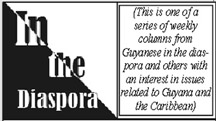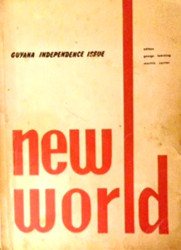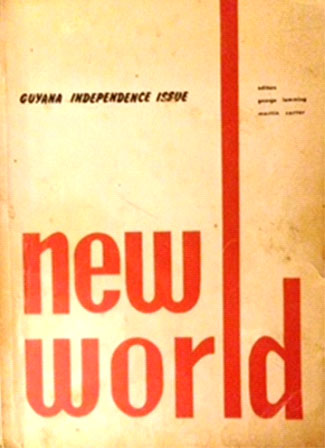Nigel Westmaas

The terms “commemorate” and “celebrate” are obviously quite close in meaning but “commemorate” holds more reflective promise. To “commemorate” is to recall and show respect for something in a ceremony”. To “celebrate” is to “publicly acknowledge a significant happy day or event with a social gathering or enjoyable activity”. I would say “celebrate” and proclaim “patriotism returns” only if the country simultaneously engages in historical reflection and public education towards the end of critical assessment, introspection, and action.

How do you celebrate or commemorate when the community of readers is so low and there is very little national historical reflection or serious dialogue across ethnic, political, social, structural and cultural divides? How many current ministers of the regime (or for that matter members of parliament) have read important Guyanese texts or even appreciate the immense significance of 50 years as nation beyond the buntings, flags and expected self-congratulations?
The former PPP regime for its part is on the opposite side of the spectrum. That party, in government and opposition, was incapable of understanding the importance of working towards a nationalist discourse. It continues to place its cards in its strategic determination to harass the new regime with the ultimate aim of asserting its ethnic electoral base for national elections in the next four years.
NEW WORLD 1966
In 1966 the New World group published a glossy independence magazine issue containing numerous seminal pieces by Guyanese and non-Guyanese heralding independence. The Prime Minister Forbes Burnham wrote the following in the foreword to the magazine: “This is a moment when our feelings must transcend electoral rivalries and ideological differences…we can be the haven for new and revolutionary thought and the place where there can be a free exchange of ideas and concepts” Among the contributors in the 1966 independence issue were Wilson Harris, Cheddi Jagan, Martin Carter, CLR James, Donald Locke, Eusi Kwayana, David de Caires, Lloyd Best, and Walter Rodney. Rodney’s piece in the magazine was titled “Masses in Action” and it is an irony that 50 years later, the fortuitous arrival of the controversial Walter Rodney commission of inquiry report has been tabled. And yet this does not seem to be leading to a moment of openness, together with the other old and new cold cases and assassinations in Guyana that could have led to healing and reconciliation. Instead, Guyanese at home and abroad are seeing the strategy of denial and dismissal, while protection of the historical narrative of one member of the coalition, the PNC, has been invoked by the government through the President. Burnham’s exhortation for a “free exchange” has evaporated in the 50 years since the words were written.
Guyana has to overcome the current discomfort with addressing the Rodney matter. As David Hinds stated so eloquently, Rodney, Courtney Crum-Ewing and Ronald Waddell and other murders and assassinations must be treated with the same kind of intensity. The country requires this for reconciliation and not for scoring political points which is the daily prevailing order of response.
The list of what we have not achieved as a nation state is long and deep and will take a long time to set right. Kissoon and others have elaborated on many of the negative stark realities of contemporary Guyana. I can add an additional well known few:
– The inability to achieve even basic multiracial achievements or national healing
– continued rural-urban divide in Guyana
– serious domestic and interpersonal violence especially against women
– astronomically high levels of suicide
– blue collar and white collar crime and unprecedented levels of corruption, especially from the previous PPP regime
– sloth of all parties on the question of constitutional reform – a critical ingredient of our success in developing and improving the nation-state in the future
– the national disrespect for archives and historical record keeping that goes beyond just famous, politically derived special days.
– the right of the citizen of Guyana to be accorded due respect in spite of his/her political affiliation, social class, or race.
– the need for respect for workers and rights of trade unions and the clear inability of the society to confront poverty rigorously and with urgency
– attention given to Amerindian land rights and respect for indigenous peoples
But there have been significant positive moves by the new regime. We should also recognise:
– The APNU-AFC handling of the garbage crisis and the cleaning and refurbishing of Georgetown.
– the government’s diligence in effecting legislation and other frameworks to pursue white collar crime, past and present, and to protect the nation’s money and property
– facilitating the return of local government elections after 22 years
– the outreach community visits and the taking of people’s testimony and complaints.
Let’s hope these achievements will be an ongoing, organic strategy and template of the APNU-AFC regime.
PUBLIC EDUCATION
AND THE GUYANA PAST
Among the overarching issues faced by the country is the longstanding decline in the country’s education system, massive emigration of skills, political and social apathy, and with the advent of the PPP administration 24 years ago, this lethargy and corruption was taken to greater levels of despair.
How do Guyanese view the subject of history and more specifically, Guyanese history? How do historical events loom in the public attention except in trite remembrance at convenient national days? Why is the great leader of 1763, Cuffy, viewed only as an icon in the overall context of Guyanese history? The fact that Cuffy took the Berbice area for a period longer than a year, and that this event preceded the Haitian revolution of 1791-1804 by nearly 30 years is of great significance in the historical record. Yet for many Cuffy is simply a name of a famous Guyanese or for that matter a national monument. What about one of the more brilliant of the Berbice rebellion commanders, Fortuijn? Historian Anna Benjamin has introduced the latter’s role into the complex seams of 1763.
In like vein the continuing postcolonial trauma of Guyana speaks to the country’s incapacity to confront some of the silences of the past. There is considerable neglect of many periods of its history and how that history is reported.
The “1950s” and “1960s” have been invoked as a mantra or totality of Guyana’s political history. Almost every political and historical discussion is conducted from the framework of these decades. And this will be repeated in the coming months. While these two broad time zones have held much (mainly negative) consequences for the present, there is a point at which the constant repetition of the 50s and 60s lends itself to a certain triteness and superficiality in the nation’s historical record. Where are the local archives and records of our own political organisations and trade unions? Apart from the big two, the PPP and PNC, where are official and unofficial records of the significance and impact of political organisations like the Popular Party of the 1920s, the United Democratic Party (UDP) of the 1950s, the United Force, and WPA?
The despair with how Guyanese history is supported and conveyed to the public is not a new problem. In research into political organisations in this country I managed to uncover approximately ninety Guyanese political organisations that were active at one level or the other in the 20th and 21st centuries. Many stood out enough to warrant more serious examination. One example is the United Demo-cratic Party UDP of the 1950s which boasted among its membership Sir John Carter, Charles Denbow, Lionel Luckhoo and others. In its time the UDP was dwarfed by the two giants the PPP and PNC (with their earlier titles, PPP(B) and PPP(J)). The historical discourse of the country continues to exclude parties like the UDP because they were either a third force or for that matter pro capitalist or centrist outfits. The UDP manifesto was well thought out, and even offered a serious programme for the development of the Guyanese working class. It is a fact that the perennial focus on Burnham and Jagan and their respective political parties has forced others away from the Guyanese political narrative – and we know naught about political entities like the UDP. There were still others requiring national examination. Likewise absent from the political story of Guyana are organisations like the Guiana National Party (GNP), the National Democratic Party (1950s) whose main candidate was Dr. Carlyle Miller, and the Guyana Independence Movement (established in 1958 and led by Jai Narine Singh) among the scores of other lesser known political entities.
As we head into the May events, nowhere is nationalist vigilance perhaps more important than in the defence of Guyana’s borders and sea. Here too public education must be a priority that goes hand in hand with the symbolism. Only the other day someone made a plea for the Guyana state apparatus to strenuously engage Venezuela on all fronts globally and inform and educate the general public about the issue. Every schoolchild should not only hear about “not a blade of grass” but why since 1899 Guyana is entitled to such a slogan. Otherwise it is mere parroting and repetition of clichés injurious to the confidence in the country’s historical record. Hopefully, before, during and after the Golden Jubilee commemoration, Guyanese and the current government will not only invoke the flag and “patriotism” but simultaneously ask searching questions and offer blunt criticisms of the country’s continued failings in so many areas of national life. Such an effort will require true patriotism.






